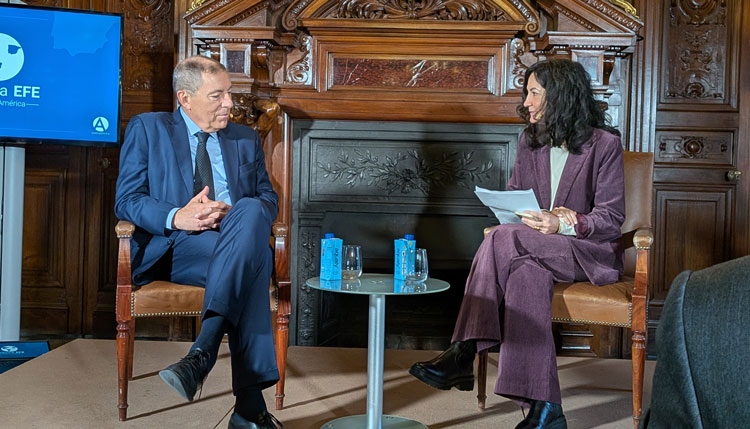The Diplomat
Uruguay’s Minister of Economy and Finance, Gabriel Oddone, is currently engaged in a busy schedule during his visit to Spain, which includes numerous professional meetings and visits to Casa América, specifically its EFE Forum, and the Spanish Chamber of Commerce.
In the former, Emilia Pérez, International Director of the EFE News Agency, interviewed the Uruguayan minister, who stated that his country’s government is working to find a solution to the dispute with the Spanish shipyard Cardama and noted that advisors from the company have approached the Uruguayan government to reach an agreement.
In this regard, he said that Cardama’s advisors have made “mediation initiatives” and have approached the Uruguayan government to find a solution to the conflict. He also indicated that he would “most likely” address this issue during a planned meeting with advisors to Spanish Prime Minister Pedro Sánchez at the Moncloa Palace.
Last October, the Uruguayan government decided to terminate its contract with the Spanish shipyard Cardama for the purchase of two offshore patrol vessels (OPVs) after discovering that EuroCommerce -the company that was supposed to provide the guarantee- was in liquidation.
In response to a question from The Diplomat regarding economic relations between Uruguay and the European Union and Spain, Minister Oddone noted that “the main investor in Uruguay is the European Union, but Spain in particular. In fact, Uruguay has an extraordinary relationship with Spain, for example, in the financial system.”
“In two of Uruguay’s main banks, Banco Santander and BBVA, Spain plays a very important role in the infrastructure sector. Construction companies, in partnership with Uruguayan firms, are expanding their involvement in various infrastructure projects. And there are a number of activities in which telephony, until recently, and other services linked to Spain play a very significant role. Regarding the European Union, Uruguay primarily exports traditional products to Europe, mainly food, where in many cases there are limited agreements that include sales quotas. And the European Union is an important provider of investment, on the one hand, and of sophisticated products, on the other. In particular, Uruguay has three very significant investments in pulp production. The three largest industrial investments in Uruguay’s history are of Finnish and Swedish origin,” responded Minister Gabriel Oddone.
Later, the business visit moved to the Spanish Chamber of Commerce, where the minister expressed his optimism regarding the EU-Mercosur Agreement, which will eliminate more than 90% of bilateral tariffs and reduce barriers, creating a more competitive and transparent environment for trade. “This agreement is essential in an international context marked by geopolitical tensions and disruptions in supply chains, because it will allow us to diversify markets, consolidate investments, and strengthen our position as a reliable partner in the region.”
During his remarks at the business meeting organized jointly with the Spanish Confederation of Employers’ Organizations (CEOE) and the State Secretariat for Trade through ICEX Spain Export and Investment, the minister explained that his country offers political stability, legal certainty, and a firm commitment to social protection, “attributes that make us an attractive destination for foreign investment and a strategic ally for Spain and the European Union.”
Gabriel Oddone also noted that Uruguay has “gone 20 years without a systemic crisis, offers fiscal stability, and has extensive social protection coverage.” The Minister of Economy and Finance had the opportunity to detail his vision for the country’s strategic sectors (energy, water resources, and logistics/ports), as well as the government’s long-term objectives, which include macroeconomic stability, investment incentives, social protection, and security.
The Secretary of State for Trade, Amparo López Senovilla, then took the floor, highlighting the experience of Spanish companies that “have developed high-impact projects in Uruguay, a country where Spain is already the leading investor, with more than $7.6 billion invested and an environment that continues to favor the arrival of new Spanish companies.” According to the Secretary of State for Trade, “this interest of Spanish companies in Uruguay will be reinforced by the EU-Mercosur Agreement, which we hope to ratify and sign soon. New opportunities will open up, strengthening economic and trade ties between both markets.”
The president of the Spanish Chamber of Commerce, José Luis Bonet, also agreed, noting “the dynamic effect the EU-Mercosur Agreement will have on our trade, an agreement that is strongly supported by the governments and businesses of both countries.” He emphasized the significant long-term economic and social commitment of Spanish companies based in Uruguay and the favorable business environment they find there, thanks to “the stability provided by the multiannual budgetary framework, legal certainty, and incentive systems such as free trade zones, which are genuine platforms for accessing the regional market.”
